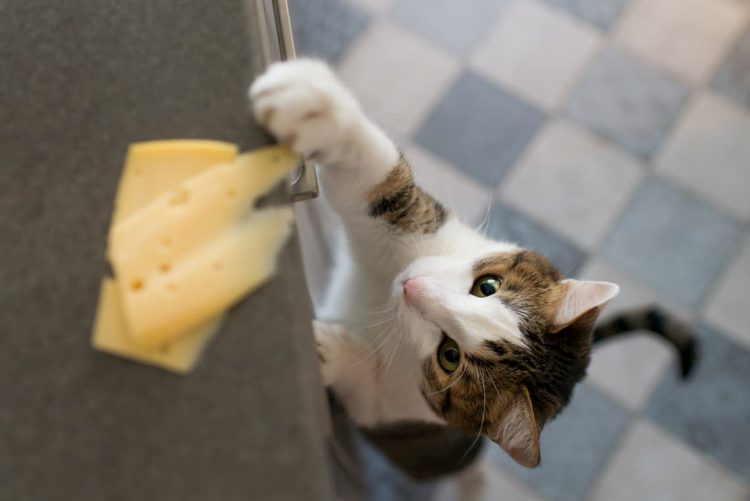Cats can eat certain types of cheese – but it would be better if they didn’t. Almost all cats are lactose intolerant, which means cheese should be out of the question. There are lactose-free options, but they present no nutritional benefit to cats.
Even though most cats like cheese (and some of them love it), the truth is they should stay as far away from it as they can. Cheese and other dairy products can cause problems for a cat – everything from an upset stomach to more life-threatening issues can arise from cheese consumption.
At the end of the day, if cheese makes your cat really, really happy, you can look for lactose-free, cat-friendly cheese brands that you can use. A quick chat with your vet is a great idea before buying the right cheese for your cat.
Is cheese bad for cats?
Cheese is bad news for cats. Milk and dairy products (like cheese) will bring all sorts of issues to a cat’s stomach. On the slim chance your cat isn’t lactose intolerant, cheese has no real value for your cat. It’ll be tasty, but it’ll lack the protein a cat needs.
Nine times out of ten, your cat is going to have a bad time after eating cheese – so, why risk it? There are countless alternatives when it comes to cat treats, and cheese is nowhere near that list.
Even if your cat seems to love cheese, you should look for other alternatives. That way, your cat will forget about cheese altogether.
At the end of the day, your cat will still love cat food, treats – and you!
What happens if a cat eats cheese?
There’s a slim chance that nothing bad will happen if a cat eats cheese. There’s also a big chance that a cat will turn out to be lactose intolerant. That means that after eating cheese, the cat will end up suffering from diarrhea, vomiting, and an overall upset stomach.
As you know, cats and cheese don’t mix that well. You might be wondering about non-dairy cheese, and that could prove a little bit problematic as well.
Several non-dairy cheese options have high-salt and high-fat ingredients, which could prove harmful for a cat. Sometimes, they too have things like onions, which cats find toxic.
Check the ingredients before giving your cat any sort of cheese. Keep in mind there are better alternatives out there, though. Better, more nutritionally dense treats your cat can have!
What kind of cheese is good for cats?
You should check with your vet before buying any cheese, whether it’s dairy or non-diary. Make sure you know what ingredients the cheese has and whether any of them could harm your cat.
After checking with your vet and making sure the cheese is okay for your cat, start little by little. Feed your cat little pieces throughout extended periods of time.
Wait and see how your cat reacts before moving on. If there’s something wrong, no matter how small, stop it altogether.
